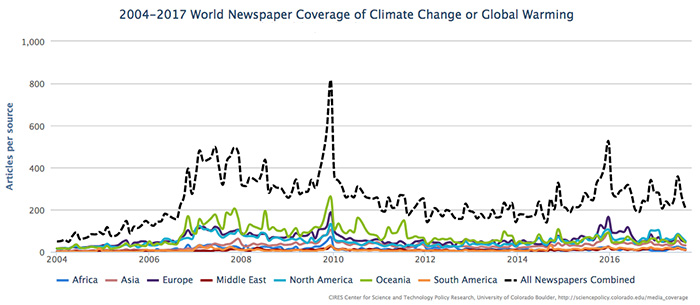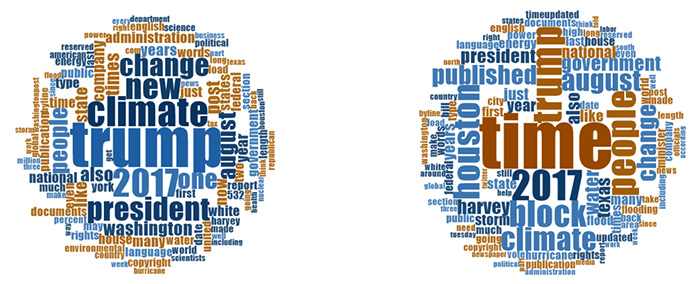Monthly Summaries
Issue 8, August 2017
[DOI]
August media attention to climate change and global warming marked a second consecutive month of lower coverage throughout the world. Articles were down 20% globally from coverage in the previous month of July. While August 2017 counts from fifty-two sources across twenty-eight countries in seven regions around the world were up 7% from coverage in August 2016, coverage in the month was also down about 20% from the average number of stories appearing each month in 2017 (approximately 2300 stories per month from January - August 2017).
Figure 1 shows these ebbs and flows in media coverage - organized into seven geographical regions around the world - from January 2004 through August 2017.

Figure 1. Media coverage of climate change or global warming in fifty-two sources across twenty-eight countries in seven different regions around the world, from January 2004 through August 2017.
In the United States (US) media, political inputs clearly influenced the content of coverage. Significant attention during the last month continued to be on events and developments associated with the US Trump Administration. Figure 2 shows frequency of words in articles across the US and in the UK in August 2017. In the US press, Trump was invoked 3046 times through the 532 stories this month in The Washington Post, The Wall Street Journal, The New York Times, USA Today, and the Los Angeles Times. In the UK press, Trump was mentioned in the Daily Mail & Mail on Sunday, Guardian & The Observer, the Sun, the Daily Telegraph & Sunday Telegraph, the Daily Mirror & Sunday Mirror, the Scotsman & Scotland on Sunday, and the Times & Sunday Times a combined 987 times in 446 August articles. This effectively continued the 'Trump Dump' that was mentioned in previous summaries and that has been detected since January 2017.
Looking further into coverage, hurricane Harvey - making landfall on US soil in Texas on August 25th as a Category 4 storm with winds of 130 mph - grabbed significant coverage relating to ecological and meteorological issues. In US media, the city of 'Houston' was invoked along with articles on climate change or global warming 3523 times, 'hurricane' was mentioned 1202 times and 'Harvey' was noted explicitly 1933 times. The ecological/meteorological event garnered a great deal of article content in the UK press as well, as the city of 'Houston' was cited 3116 times, 'Harvey' was mentioned 1431 times and 'hurricane' was explicitly referenced 1202 times as well.

Figure 2. Word clouds showing frequency of words invoked in media coverage of climate change or global warming in the United States (on left) and the United Kingdom (on right) in August 2017. Data are from five US sources (The Washington Post, The Wall Street Journal, The New York Times, USA Today, and the Los Angeles Times) and seven UK sources (the Daily Mail & Mail on Sunday, Guardian & The Observer, the Sun, the Daily Telegraph & Sunday Telegraph, the Daily Mirror & Sunday Mirror, the Scotsman & Scotland on Sunday, and the Times & Sunday Times).
The content of coverage of hurricane Harvey discussed the 'unprecedented' nature of the storm that left trillions of tons of water in Texas. A number of articles focused on the extreme precipitation event in a short period of time, while some articles discussed links with the physics of the atmosphere and oceans (where warmer air could hold more water and where warmer water could provide increased energy for the storm). For example, Dr. Kenneth Kunkel from the North Carolina Institute for Climate Studies told Lisa Friedman and John Schwartz of The New York Times that warmer ocean temperatures associated with a changing climate likely fed the deluge. Other articles focused on impacts from the storm, including human displacement and suffering as well as explosions of industrial chemical plants near Houston due to flooding and electrical power failures.
Further coverage of ecological and meteorological dimensions of climate change in August 2017 were tethered to record-breaking flooding in South Mumbai, India. Amrit Dhillon from The Guardian reported that the devastating flood event was part of a larger and unprecedented monsoon season in south Asia that is said to have adversely impacted more than 40 million people (with over 1,2000 feared dead) across India, Bangladesh and Nepal. Reporting on wildfires in the Pacific Northwest of the US along with fires in the formerly frozen tundra of Greenland also dotted the August landscape of media reporting on climate change or global warming.
Bridging to media coverage of scientific dimensions of climate change in August 2017, a new study of deaths by extreme weather events in Europe (southern Europe in particular) generated a number of media accounts. This study from the journal Lancet Planetary Health found that over 150,000 people annually could die by 2100 - 99% of them due to extreme heat - if no mitigation and/or adaptation strategies are deployed to address vulnerability associated with climate change. Another study reported on by Damian Carrington from The Guardian in Science Advances found that as much as 30% of South Asia could face "dangerous and unsurvivable humid heat waves" in a changing climate without mitigation and/or adaptation measures taken. Through modeling scenarios, researchers Im, Pal and Eltahir also found that 1 in 25 year extreme heat waves could become annual heat waves in an area where the paradox of climate change - that those at the forefront of climate impacts are not those that contributed to the problem - rings as true as anywhere on planet Earth. Other studies also generated coverage in August. For example, Ian Johnstone at The Independent reported on a study by Millstein et al in Nature Energy that found that avoided fossil fuel burning due to rapid deployment of wind and solar energy helped drastically decrease major pollutants in the air and prevented up to 12,700 deaths and saved US $220 billion over nine years in the US. Also, Doyle Rice from the USA Today covered the National Oceanic and Atmospheric Administration (NOAA) 'State of the Climate' report findings by scientists from over sixty countries converging in agreement that 2016 was the hottest year on record, and that greenhouse gases hit their highest recorded concentration in nearly one million years.
Prominent political news in August 2017 related to connections between climate change and the Islamic State, in the both are tied as the world’s top global security concerns in a poll by the Pew Research Center of thirty-eight countries around the world. Lisa Friedman from The New York Times noted that while climate change topped the list of concerns in thirteen countries, it ranked third in the US behind cybersecurity and ISIS. And, as an example of ongoing political and politicized moves from the Trump Administration in August, Juliet Eilperin from The Washington Post reported that the National Climate Assessment's 15-person advisory panel was being disbanded.
And in the cultural sphere, connections made between the full eclipse passing across the continental US on August 21 and climate considerations made some news as well. For instance, in a piece called 'Should You Trust Climate Science? Maybe the Eclipse Is a Clue', links between climate contrarianism and eclipse contrarianism were discussed by Justin Gillis of The New York Times. Meanwhile, other stories examined grid reliability of solar and wind in the face of the eclipse, such as an investigate piece in the Financial Times entitled 'US power grid passes a test as eclipse reduces solar generation'.
With two months remaining in the hurricane season (ending November 1), and US President Trump still to speak at the United Nations General Assembly in September, more is yet to come in climate change or global warming news along political, scientific, ecological/meteorological and cultural dimensions before the year's end. These will surely and dynamically unfold as the northern hemisphere summer gives way to Autumn and the southern hemisphere winter gives way to Spring in 2017.
